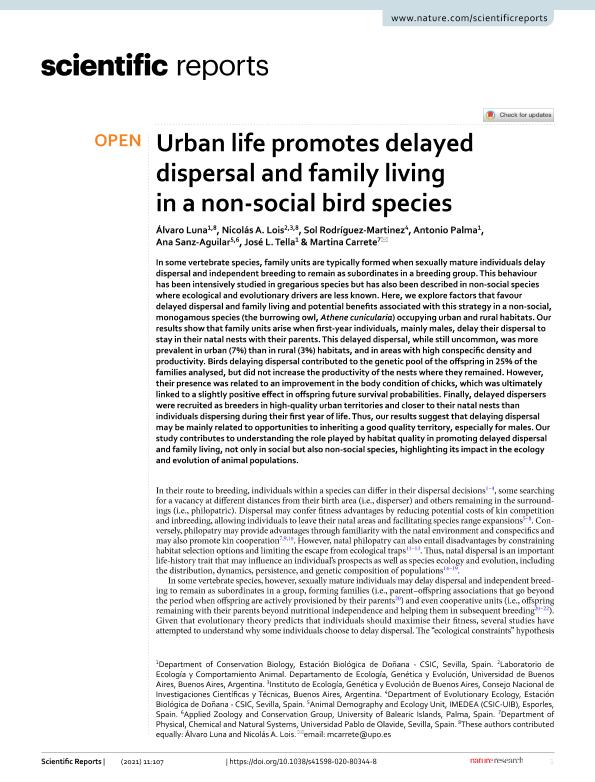Artículo
Urban life promotes delayed dispersal and family living in a non-social bird species
Luna, Álvaro Leandro; Lois, Nicolás Alejandro ; Rodríguez Martinez, Sol; Palma, Antonio; Sanz Aguilar, Ana; Tella Escobedo, José Luis; Carrete, Martina
; Rodríguez Martinez, Sol; Palma, Antonio; Sanz Aguilar, Ana; Tella Escobedo, José Luis; Carrete, Martina
 ; Rodríguez Martinez, Sol; Palma, Antonio; Sanz Aguilar, Ana; Tella Escobedo, José Luis; Carrete, Martina
; Rodríguez Martinez, Sol; Palma, Antonio; Sanz Aguilar, Ana; Tella Escobedo, José Luis; Carrete, Martina
Fecha de publicación:
12/2021
Editorial:
Nature Publishing Group
Revista:
Scientific Reports
e-ISSN:
2045-2322
Idioma:
Inglés
Tipo de recurso:
Artículo publicado
Clasificación temática:
Resumen
In some vertebrate species, family units are typically formed when sexually mature individuals delay dispersal and independent breeding to remain as subordinates in a breeding group. This behaviour has been intensively studied in gregarious species but has also been described in non-social species where ecological and evolutionary drivers are less known. Here, we explore factors that favour delayed dispersal and family living and potential benefts associated with this strategy in a non-social, monogamous species (the burrowing owl, Athene cunicularia) occupying urban and rural habitats. Our results show that family units arise when frst-year individuals, mainly males, delay their dispersal to stay in their natal nests with their parents. This delayed dispersal, while still uncommon, was more prevalent in urban (7%) than in rural (3%) habitats, and in areas with high conspecifc density and productivity. Birds delaying dispersal contributed to the genetic pool of the ofspring in 25% of the families analysed, but did not increase the productivity of the nests where they remained. However, their presence was related to an improvement in the body condition of chicks, which was ultimately linked to a slightly positive efect in ofspring future survival probabilities. Finally, delayed dispersers were recruited as breeders in high-quality urban territories and closer to their natal nests than individuals dispersing during their frst year of life. Thus, our results suggest that delaying dispersal may be mainly related to opportunities to inheriting a good quality territory, especially for males. Our study contributes to understanding the role played by habitat quality in promoting delayed dispersal and family living, not only in social but also non-social species, highlighting its impact in the ecology and evolution of animal populations.
Palabras clave:
Athene cunicularia
,
Breeding behaviour
,
Urban ecology
,
Habitat quality
Archivos asociados
Licencia
Identificadores
Colecciones
Articulos(IEGEBA)
Articulos de INSTITUTO DE ECOLOGIA, GENETICA Y EVOLUCION DE BS. AS
Articulos de INSTITUTO DE ECOLOGIA, GENETICA Y EVOLUCION DE BS. AS
Citación
Luna, Álvaro Leandro; Lois, Nicolás Alejandro; Rodríguez Martinez, Sol; Palma, Antonio; Sanz Aguilar, Ana; et al.; Urban life promotes delayed dispersal and family living in a non-social bird species; Nature Publishing Group; Scientific Reports; 11; 1; 12-2021; 1-15
Compartir
Altmétricas



